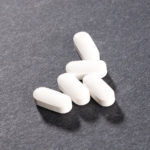By David Blyweiss, M.D.
By now, I’m sure you know my position on statin drugs—they are dangerous and often prescribed unnecessarily. For my patients with unhealthy cholesterol levels, I often opt for phytosterols as an important part of a safe and effective strategy to bring down both their total and LDL cholesterol. Phytosterols, compounds in plants with chemical structures similar to cholesterol, block food-based cholesterol from being absorbed into the bloodstream. As a result, both phytosterols and dietary cholesterol are excreted out of the body.
Because of their ability to block the absorption of cholesterol, phytosterols can significantly lower LDL levels. During a recent comparison of phytosterols and statins, Canadian researchers found virtually no difference in efficacy. In other words, they both worked equally well to lower LDL cholesterol levels. Yet, unlike statin drugs, phytosterols won’t cause any adverse side effects. As a bonus, phytosterols also promote prostate health and may help regulate blood sugar.
Phytosterols are made up of sterols and stanols. A sterol is a steroid that has a group of alcohol molecules attached to it. Stanols are saturated sterols that are similar to cholesterol, but unlike cholesterol, they aren’t absorbed by the intestines. Until now, most of the research has been on the sterol part of the equation. But, it turns out that both are important if you are looking to lower your cholesterol.
According to current recommendations, taking two grams of phytosterols each day with meals can lower LDL cholesterol levels by up to 10 percent. But new findings suggest that a higher daily dose of plant stanols may be an even more effective way of reducing cholesterol. Indeed, in a trial of 93 people with slightly elevated cholesterol levels, Dutch and German scientists discovered that taking up to nine grams of plant stanols per day could reduce LDL cholesterol by more than 17 percent—results that are comparable to the cholesterol absorption inhibiting drug Zetia.
The month-long trial used margarine that contained either three, six or nine grams of plant stanols. A control margarine was stanol-free. Each of the participants was assigned to either one of the stanol doses or the placebo. After four weeks of intervention, the researchers found that LDL cholesterol levels decreased more with increasing stanol doses. Indeed, people in the three grams per day group experienced LDL reductions of 7.4 percent, compared with 11.9 and 17.4 percent in the six and nine grams per day groups.
The study also reported good news for antioxidants. For years, researchers have suspected that phytosterols reduced our antioxidant defenses, especially those from fat-soluble vitamins. But the researchers didn’t observe any changes—either good or bad—in beta-carotene, lutein or vitamin E levels. They also noted that HDL (good) cholesterol levels were unaffected.
The World's Quickest Solution for Ending Prostate and Urinary Misery
This has recently been revealed to be one of the only real breakthroughs in prostate health.
The seeds of a strange fruit (sometimes called "Chinese Apples") hold powerful phytonutrients that are a revolution in prostate health.
In fact, UCLA and Veterans Administration research have now proved this to be true.
Not only that, but it may be the worlds quickest solution for ending prostate misery.
Simply stated, these phytonutrients represent a huge step beyond beta sitosterol, saw palmetto, and other phytosterols alone.
Simply click HERE if you want to have fast prostate relief...restful, uninterrupted sleep...no more constant "urges to go"...enhanced virility...and optimal prostate support for life.
Here’s even more good news: if you truly need to take statin drugs, you should be aware that adding phytosterols to your statin therapy can lower your cholesterol levels even further. Clinical trials suggest that, for someone already on statins, taking phytosterols can result in an additional seven to 11 percent reduction in LDL cholesterol—an effect comparable to doubling the dose of statins. Because of this, your doctor may be able to reduce the dose. But make sure you work with your doctor before reducing or stopping your medication.
Whether you take statins or not, adding phytosterols to the equation can help bring your cholesterol back into a healthy range. While many foods now add plant sterols and stanols (think margarine, yogurt and orange juice), I have found that taking them in supplemental form provides more consistent results. Look for a supplement that contains both sterols and stanols, and be sure to take it with a meal that contains at least some fat.
References:
Goldberg AC, et al. Effect of plant stanol tablets on low-density lipoprotein cholesterol lowering in patients on statin drugs. American Journal of Cardiology. 2006;97:376-379.
Mensink R. Plant stanols dose-dependently decrease LDL-cholesterol concentrations, but not cholesterol-standardized fat-soluble antioxidant concentrations, at intakes up to 9 g/d. American Journal of Clinical Nutrition. 2010;92:24-33.
Wu T, et al. The effects of phytosterols/stanols on blood lipid profiles: a systematic review with meta-analysis. Asia Pacific Journal of Clinical Nutrition. 2009;18:179-186






